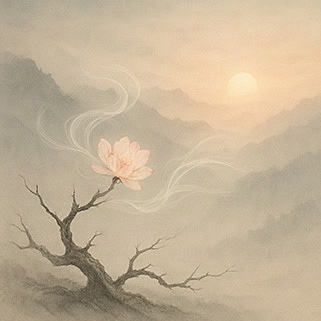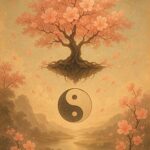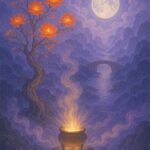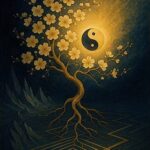Xieyi・The Rootless Tree:100 Verses-Verse 23#533

The poems of “The Rootless Tree” express a fundamental force rooted in harmony with heaven and earth, the cyclical flow of yin and yang, and the infinite potential of existence。
This painting is an expressive “Xieyi” in the tradition of “futu” (spiritual diagrams), passed down for generations in Wudang Mountain, China. It is drawn through a technique where energy flow (xingqi) channels the internal intention into visual form。 In the Taoist world, there exist spiritual and symbolic images called “futu”。
In the Taoist world, there exist spiritual and symbolic images called “futu”。
These are a type of talisman—not merely religious items, but expressive spiritual paintings that act directly on the mind of the viewer。
Since ancient times, many people have placed these Taoist-style “Xieyi” and futu in their homes, studies, or bedrooms, wishing for longevity, health, auspiciousness, and family harmony. Viewing such paintings was not just aesthetic appreciation, but an act of inviting the presence of the Dao into one’s life and tuning the body and mind。
Thus, “Xieyi” is more than artistic expression—it is a medium that bridges the spirit, life, and harmony with the universe。
This kind of artwork is not meant to be seen only with the eyes, but felt with the heart。
It communicates with the Dao, resonates with the qi of nature, and quietly stirs the viewer’s inner self。
Futu and “Xieyi” continue to live on from ancient times to this day as “sacred images that speak to the soul.”
Below, we present the original text of the philosophical poem “The Rootless Tree,” along with a modern Japanese translation and interpretation。
※ The author of “The Rootless Tree,” Zhang Sanfeng (1247–?), is also renowned as the founder of Tai Chi, and it is said that he applied the essence of this work to Tai Chi. As an additional note, we include an interpretation connecting this to the Tai Chi tradition of Wudang Mountain.
The Rootless Tree:100 Verses-Verse 23

Original Text
無根樹,花正新,一枝獨秀當日成。風吹無聲無淚滴,萬物皆空靜自清。
Modern Translation
On a rootless tree a new flower appears—One branch alone rises toward the sun.
Though winds blow, there is no sound, no tear;
All things are empty—silent, naturally clear.
Interpretation
1.[無根樹,花正新] Fresh power arising from emptiness.
2.[一枝獨秀當日成] A lone branch excels, ripening in a single day.
3.[風吹無聲無淚滴] Wind yields no noise, no weeping—undisturbed mind.
4.[萬物皆空靜自清] Seeing all as empty, the world grows quiet and pure.
Interpretation related to Tai Chi
•Sudden breakthroughs can flower in beginners.
•Progress is personal, not a contest.
•Maintain still mind amid external push.
•Emptiness opens the gate to wu-wei practice.
Copyright © MASAKI WAKABAYASHI. All rights reserved.




